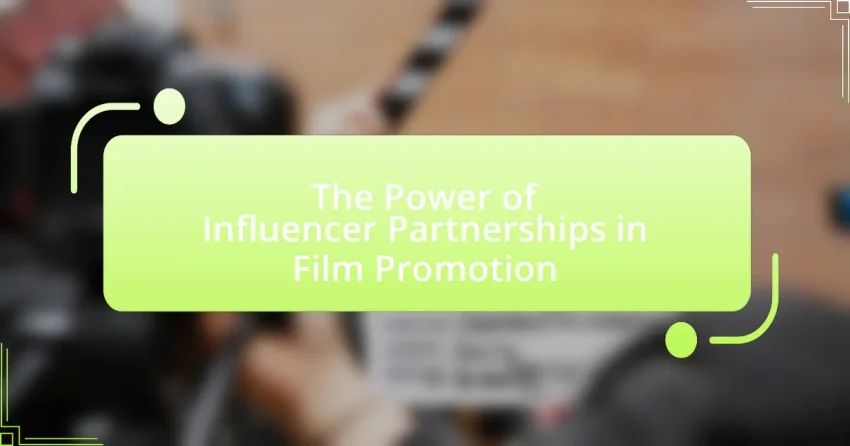The article focuses on the significance of influencer partnerships in film promotion, highlighting how collaborations between filmmakers and social media influencers enhance visibility and drive ticket sales. It discusses the mechanics of these partnerships, including content creation, audience engagement, and the effectiveness of influencer recommendations in shaping consumer behavior. Key benefits such as increased audience reach, improved credibility, and higher box office performance are examined, along with strategies for selecting the right influencers and measuring campaign success. Additionally, the article addresses common challenges and offers practical tips for maximizing the effectiveness of influencer collaborations in the film industry.

What are Influencer Partnerships in Film Promotion?
Influencer partnerships in film promotion are collaborations between filmmakers or studios and social media influencers to enhance the visibility and marketing of a film. These partnerships leverage the influencer’s audience and credibility to create buzz, generate interest, and drive ticket sales. For instance, a study by the Digital Marketing Institute found that 49% of consumers depend on influencer recommendations when making purchase decisions, highlighting the effectiveness of such collaborations in reaching target demographics.
How do influencer partnerships function in the context of film promotion?
Influencer partnerships function in film promotion by leveraging the reach and credibility of influencers to engage target audiences effectively. Influencers create content that showcases the film, such as reviews, behind-the-scenes footage, or themed challenges, which can generate buzz and drive interest among their followers. For instance, a study by the Digital Marketing Institute found that 49% of consumers depend on influencer recommendations when making purchase decisions, highlighting the effectiveness of this strategy in influencing audience behavior. Additionally, collaborations often include exclusive screenings or giveaways, further incentivizing engagement and enhancing the film’s visibility across social media platforms.
What roles do influencers play in promoting films?
Influencers play a crucial role in promoting films by leveraging their large followings to create buzz and generate interest. They engage audiences through social media platforms, sharing trailers, behind-the-scenes content, and personal endorsements that can significantly enhance a film’s visibility. For instance, a study by the Digital Marketing Institute found that 49% of consumers depend on influencer recommendations when making purchase decisions, highlighting the effectiveness of influencers in shaping public perception and driving ticket sales.
How do influencers engage with their audience regarding film content?
Influencers engage with their audience regarding film content primarily through interactive social media posts, live streams, and curated content that resonates with their followers. They create discussions around film releases by sharing trailers, behind-the-scenes footage, and personal reviews, which fosters a sense of community and encourages audience participation. For instance, influencers often host Q&A sessions or polls related to films, allowing their audience to express opinions and preferences, thereby enhancing engagement. This method is effective as it leverages the influencers’ established trust and rapport with their followers, leading to increased interest and viewership for the films they promote.
Why are influencer partnerships becoming essential in film marketing?
Influencer partnerships are becoming essential in film marketing because they effectively reach and engage target audiences through trusted voices. Influencers possess established credibility and a loyal following, which allows films to tap into niche markets and generate authentic buzz. According to a 2021 survey by the Digital Marketing Institute, 49% of consumers rely on influencer recommendations when making purchase decisions, highlighting the significant impact influencers have on audience behavior. This trend is further supported by the fact that films leveraging influencer marketing have seen up to a 30% increase in ticket sales compared to those that do not utilize such strategies.
What trends are driving the rise of influencer partnerships in the film industry?
The rise of influencer partnerships in the film industry is primarily driven by the increasing importance of social media engagement and audience targeting. Influencers possess the ability to reach niche audiences effectively, which allows film marketers to tailor their promotional strategies to specific demographics. According to a 2021 study by the Influencer Marketing Hub, 90% of marketers found influencer marketing to be effective, highlighting its growing significance in film promotion. Additionally, the shift towards digital consumption of content, accelerated by the COVID-19 pandemic, has made influencer collaborations a vital tool for generating buzz and driving viewership for films.
How do influencer partnerships compare to traditional marketing methods?
Influencer partnerships are generally more effective than traditional marketing methods in reaching target audiences and driving engagement. Influencers have established trust and credibility with their followers, which can lead to higher conversion rates compared to traditional advertisements that often lack personal connection. For instance, a study by the Digital Marketing Institute found that influencer marketing can yield an ROI of $6.50 for every dollar spent, significantly outperforming traditional marketing channels, which average around $2.00 for the same investment. Additionally, influencer partnerships allow for more authentic storytelling and content creation, which resonates better with consumers, as evidenced by a survey from HubSpot indicating that 70% of millennials are influenced by the recommendations of their peers, including social media influencers.

What are the Benefits of Influencer Partnerships in Film Promotion?
Influencer partnerships in film promotion provide significant benefits, including enhanced audience reach, increased engagement, and improved credibility. By collaborating with influencers who have established trust with their followers, films can tap into niche markets and demographics that traditional marketing may overlook. For instance, a study by the Digital Marketing Institute found that 49% of consumers depend on influencer recommendations, highlighting the effectiveness of this strategy in driving audience interest and ticket sales. Additionally, influencers often create authentic content that resonates with their audience, leading to higher engagement rates compared to conventional advertising methods. This combination of reach, engagement, and credibility makes influencer partnerships a powerful tool in film promotion.
How do influencer partnerships enhance audience reach for films?
Influencer partnerships enhance audience reach for films by leveraging the established trust and engagement that influencers have with their followers. Influencers can create authentic content that resonates with their audience, effectively promoting the film to a wider demographic. For instance, a study by the Digital Marketing Institute found that 49% of consumers depend on influencer recommendations when making purchase decisions, indicating that influencer endorsements can significantly impact audience interest and attendance. By collaborating with influencers who align with the film’s target audience, filmmakers can tap into niche markets and increase visibility, ultimately driving higher box office sales and viewership.
What demographics are most effectively targeted through influencer marketing?
Millennials and Generation Z are the demographics most effectively targeted through influencer marketing. These age groups, typically ranging from 18 to 34 years old, are highly engaged with social media platforms where influencers operate. According to a 2021 survey by the Digital Marketing Institute, 70% of millennials and 67% of Gen Z consumers reported being influenced by social media when making purchasing decisions. This indicates a strong correlation between influencer marketing and the purchasing behaviors of these demographics, making them prime targets for brands looking to promote products, including films.
How do influencers help in building anticipation for film releases?
Influencers build anticipation for film releases by leveraging their large and engaged audiences to create buzz and excitement. They achieve this through strategic content creation, such as sneak peeks, behind-the-scenes footage, and personal endorsements, which resonate with their followers. For instance, a study by the Digital Marketing Institute found that 49% of consumers depend on influencer recommendations when making purchase decisions, highlighting the effectiveness of influencers in shaping audience perceptions. By sharing exclusive content and engaging in conversations about the film, influencers can significantly enhance visibility and generate a sense of urgency, leading to increased interest and ticket sales upon release.
What impact do influencer partnerships have on film box office performance?
Influencer partnerships significantly enhance film box office performance by leveraging the influencers’ reach and credibility to engage target audiences. Studies indicate that films promoted through influencer marketing can experience up to a 30% increase in opening weekend box office revenue compared to those without such partnerships. For instance, the film “It: Chapter Two” utilized influencer campaigns that resulted in heightened social media buzz, contributing to its $91 million opening weekend. This correlation demonstrates that influencer partnerships effectively drive audience interest and attendance, ultimately boosting box office success.
How can influencer campaigns lead to increased ticket sales?
Influencer campaigns can lead to increased ticket sales by leveraging the influencer’s established audience and credibility to promote events. When influencers share their experiences or endorsements of a film, they create authentic connections with their followers, which can drive interest and urgency to purchase tickets. For instance, a study by the Digital Marketing Institute found that 49% of consumers depend on influencer recommendations for their purchasing decisions, highlighting the effectiveness of influencer marketing in influencing consumer behavior. Additionally, influencers often create engaging content that showcases the film, further enhancing visibility and appeal, ultimately resulting in higher ticket sales.
What metrics can be used to measure the success of influencer partnerships?
Metrics that can be used to measure the success of influencer partnerships include engagement rate, reach, conversion rate, and return on investment (ROI). Engagement rate, calculated by the total interactions (likes, comments, shares) divided by total followers, indicates how well the audience connects with the content. Reach measures the total number of unique users who see the content, providing insight into the campaign’s visibility. Conversion rate, determined by the number of desired actions taken (such as ticket purchases or sign-ups) divided by total interactions, assesses the effectiveness of the partnership in driving specific outcomes. ROI, calculated by comparing the revenue generated from the campaign to the costs incurred, evaluates the overall financial success of the influencer collaboration. These metrics collectively provide a comprehensive view of the effectiveness of influencer partnerships in film promotion.

What Strategies Can Be Employed for Effective Influencer Partnerships?
Effective influencer partnerships can be achieved through targeted selection, clear communication, and measurable goals. Targeted selection involves identifying influencers whose audience aligns with the film’s target demographic, ensuring relevance and engagement. Clear communication establishes expectations regarding content, timelines, and deliverables, fostering a collaborative environment. Measurable goals, such as tracking engagement rates and conversions, provide insights into the partnership’s effectiveness. Research indicates that campaigns with well-defined objectives and aligned influencer audiences see up to 11 times higher ROI compared to those without such strategies.
How should filmmakers select the right influencers for their projects?
Filmmakers should select the right influencers by evaluating their audience alignment, engagement rates, and relevance to the film’s themes. Audience alignment ensures that the influencer’s followers match the target demographic of the film, which can enhance promotional effectiveness. Engagement rates, measured through likes, comments, and shares, indicate how actively the influencer interacts with their audience, suggesting a higher likelihood of influencing viewer behavior. Relevance to the film’s themes ensures that the influencer’s content resonates with the film’s message, creating authentic promotion. For instance, a study by Influencer Marketing Hub found that campaigns with well-matched influencers can achieve up to 11 times higher ROI compared to those without strategic alignment.
What criteria should be considered when evaluating potential influencers?
When evaluating potential influencers, key criteria include audience engagement, relevance to the film’s target demographic, authenticity, and reach. Audience engagement measures how actively followers interact with the influencer’s content, which is crucial for effective promotion. Relevance ensures that the influencer’s content aligns with the film’s themes and appeals to the intended viewers, enhancing the likelihood of successful outreach. Authenticity refers to the influencer’s genuine connection with their audience, as followers are more likely to trust recommendations from influencers they perceive as honest. Reach indicates the size of the influencer’s audience, which can amplify the film’s visibility. According to a study by Influencer Marketing Hub, campaigns with higher engagement rates can yield up to 11 times the ROI compared to traditional marketing methods, underscoring the importance of these criteria in influencer evaluation.
How can filmmakers ensure alignment between the influencer’s brand and the film’s message?
Filmmakers can ensure alignment between the influencer’s brand and the film’s message by conducting thorough research on the influencer’s values, audience, and previous collaborations. This alignment is crucial because mismatched branding can lead to audience confusion and diminish the film’s impact. For instance, a study by Influencer Marketing Hub indicates that 63% of consumers trust influencers more than brands, highlighting the importance of authentic partnerships. By analyzing the influencer’s content and engagement metrics, filmmakers can select individuals whose messaging complements the film’s themes, thereby enhancing promotional effectiveness and audience reception.
What are the best practices for collaborating with influencers in film promotion?
The best practices for collaborating with influencers in film promotion include selecting influencers whose audience aligns with the film’s target demographic, establishing clear communication and expectations, and creating authentic content that resonates with both the influencer’s followers and the film’s themes. Research indicates that 49% of consumers depend on influencer recommendations, highlighting the importance of choosing influencers who genuinely connect with the film’s message. Additionally, providing influencers with creative freedom allows for more engaging and relatable content, which can lead to higher audience engagement and interest in the film.
How can filmmakers create engaging content with influencers?
Filmmakers can create engaging content with influencers by collaborating on authentic storytelling that resonates with the influencer’s audience. This approach ensures that the content feels genuine and aligns with the influencer’s established brand, which can enhance viewer engagement. For instance, a study by the Digital Marketing Institute found that 49% of consumers depend on influencer recommendations, highlighting the effectiveness of influencer partnerships in reaching target demographics. By leveraging the influencer’s unique voice and style, filmmakers can craft narratives that not only promote the film but also foster a deeper connection with potential viewers.
What legal considerations should be taken into account when partnering with influencers?
When partnering with influencers, it is essential to consider compliance with advertising regulations, particularly the Federal Trade Commission (FTC) guidelines, which require clear disclosure of paid partnerships. Influencers must disclose their relationship with brands to maintain transparency and avoid misleading consumers. Additionally, contracts should outline the scope of work, intellectual property rights, and liability clauses to protect both parties. Legal considerations also include ensuring that the content does not infringe on copyright or trademark laws, as well as adhering to privacy laws regarding the use of personal data. These legal frameworks are crucial for mitigating risks and ensuring ethical marketing practices in influencer partnerships.
What are common challenges faced in influencer partnerships for film promotion?
Common challenges faced in influencer partnerships for film promotion include misalignment of brand values, lack of audience engagement, and difficulty in measuring return on investment (ROI). Misalignment occurs when the influencer’s persona or content does not resonate with the film’s target audience, potentially leading to ineffective promotion. A study by Influencer Marketing Hub in 2021 indicated that 63% of marketers reported challenges in finding the right influencers whose values align with their brand. Additionally, influencers may struggle to engage their followers authentically, which can diminish the impact of promotional efforts. Lastly, measuring ROI remains complex, as traditional metrics may not capture the full effect of influencer campaigns, making it hard for filmmakers to assess the success of their partnerships.
How can filmmakers address potential misalignments in influencer partnerships?
Filmmakers can address potential misalignments in influencer partnerships by establishing clear communication and aligning brand values from the outset. This involves conducting thorough research on the influencer’s audience, content style, and personal brand to ensure compatibility with the film’s message. For instance, a study by Influencer Marketing Hub indicates that 63% of marketers believe that aligning with the right influencer significantly impacts campaign success. By setting mutual expectations and regularly reviewing partnership goals, filmmakers can mitigate risks and enhance collaboration effectiveness.
What strategies can mitigate risks associated with influencer marketing?
To mitigate risks associated with influencer marketing, brands should implement thorough vetting processes for influencers, establish clear contracts, and monitor campaign performance closely. Vetting involves assessing an influencer’s audience demographics, engagement rates, and past collaborations to ensure alignment with brand values and target markets. Clear contracts should outline expectations, deliverables, and compliance with advertising regulations, reducing the likelihood of misunderstandings or legal issues. Additionally, monitoring campaign performance through metrics such as reach, engagement, and conversion rates allows brands to adjust strategies in real-time, ensuring that the partnership remains effective and aligned with marketing goals.
What practical tips can filmmakers follow to maximize the effectiveness of influencer partnerships?
Filmmakers can maximize the effectiveness of influencer partnerships by selecting influencers whose audience aligns with their target demographic. This alignment ensures that the promotional content resonates with potential viewers, increasing engagement and interest in the film. Additionally, filmmakers should establish clear communication and expectations with influencers regarding content creation, timelines, and deliverables, which fosters a collaborative environment and enhances the quality of the promotional material.
Furthermore, leveraging data analytics to track the performance of influencer campaigns can provide insights into audience engagement and conversion rates, allowing filmmakers to refine their strategies for future partnerships. Research indicates that campaigns utilizing influencer marketing can yield up to 11 times higher ROI compared to traditional advertising methods, highlighting the importance of strategic influencer selection and collaboration.
